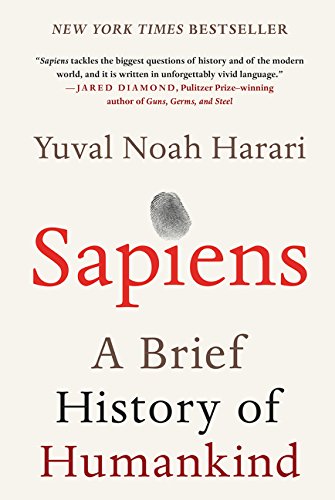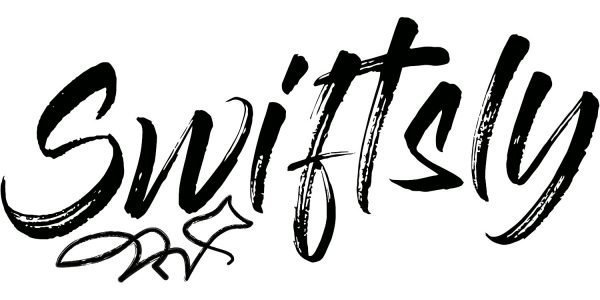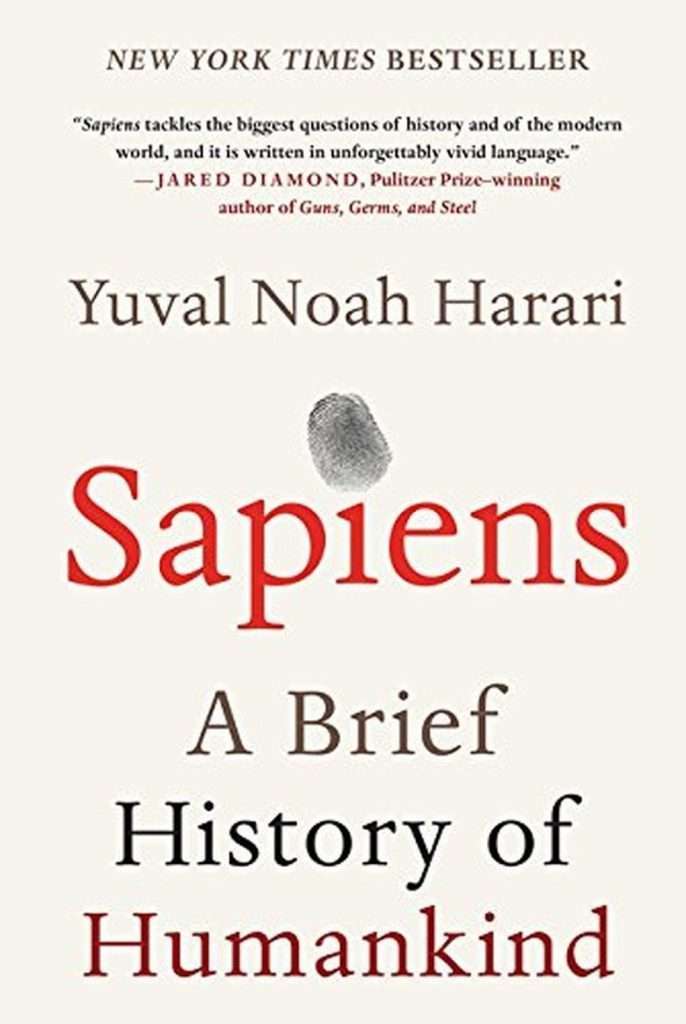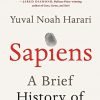Sapiens: A Brief History Of Humankind
$29.90 Original price was: $29.90.$24.95Current price is: $24.95.
Sapiens: A Brief History of Humankind Product Details Hardcover: 464 pages Publisher: Harper; 1st edition (February 10, 2015) Language: English ISBN-10: 0062316095 ISBN-13: 978-0062316097 Product Dimensions: 6 x 1.4 x 9 inches Shipping Weight: 2.5 pounds Editorial Reviews Review An Amazon Best Book of the Month for February 2015: Yuval Noah Harari
Sapiens: A Brief History of Humankind
Product Details
- Hardcover: 464 pages
- Publisher: Harper; 1st edition (February 10, 2015)
- Language: English
- ISBN-10: 0062316095
- ISBN-13: 978-0062316097
- Product Dimensions: 6 x 1.4 x 9 inches
- Shipping Weight: 2.5 pounds

Editorial Reviews Review An Amazon Best Book of the Month for February 2015: Yuval Noah Harari has some questions. Among the biggest: _How did_ Homo sapiens _(or_ Homo sapiens sapiens _, if you’re feeling especially wise today) evolve from an unexceptional savannah-dwelling primate to become the dominant force on the planet, emerging as the lone survivor out of six distinct, competing hominid species?_ He also has some answers, and they’re not what you’d expect. Tackling evolutionary concepts from a historian’s perspective, _Sapiens: A Brief History of Humankind_, describes human development through a framework of three not-necessarily-orthodox “Revolutions”: the Cognitive, the Agricultural, and the Scientific. His ideas are interesting and often amusing: _Why have humans managed to build astonishingly large populations when other primate groups top out at 150 individuals?_ Because our talent for gossip allows us to build networks in societies too large for personal relationships between everyone, and our universally accepted “imagined realities”–such as money, religion, and Limited Liability Corporations–keep us in line. _Who cultivated whom, humans or wheat?_. Wheat. Though the concepts are unusual and sometimes heavy (as is the book, literally) Harari’s deft prose and wry, subversive humor make quick work of material prone to academic tedium. He’s written a book of popular nonfiction (it was a bestseller overseas, no doubt in part because his conclusions draw controversy) landing somewhere in the middle of a Venn diagram of genetics, sociology, and history. Throughout, Harari returns frequently to another question: _Does all this progress make us happier, our lives easier?_ The answer might disappoint you. –_Jon Foro_ Review “[I]nteresting and provocativeIt gives you a sense of perspective on howbriefly we’ve been on this earth, how short things like agriculture andscience have been around, and why it makes sense for us to not take them forgranted.” (President Barack Obama) “I would recommend this book to anyone interested in a fun, engaging look atearly human historyyou’ll have a hard time putting it down.” (Bill Gates) “Thank God someone finally wrote [this] exact book.” (Sebastian Junger) “Sapiens tackles the biggest questions of history and of the modern world, andit is written in unforgettably vivid language.” (Jared Diamond, PulitzerPrize-winning author of _Guns, Germs, and Steel_, _Collapse_, and _The Worlduntil Yesterday_) “_Sapiens_ takes readers on a sweeping tour of the history of our species.Harari’s formidable intellect sheds light on the biggest breakthroughs in thehuman storyimportant reading for serious-minded, self-reflective sapiens.”(_Washington Post_) “Sapiens is learned, thought-provoking and crisply written. Fascinating.”(_Wall Street Journal_) “In Sapiens, Harari delves deep into our history as a species to help usunderstand who we are and what made us this way. An engrossing read.” (DanAriely, _New York Times_ Bestselling author of _Predictably Irrational, TheUpside of Irrationality_, and _The Honest Truth About Dishonesty_) “Yuval Noah Harari’s celebrated Sapiens does for human evolution what StephenHawking’s A Brief History of Time did for physics. He does a superb job ofoutlining our slow emergence and eventual domination of the planet.”(_Forbes_) “It is one of the best accounts by a Homo sapiens of the unlikely story of ourviolent, accomplished species.It is one hell of a story. And it has seldombeen told better. Compulsively readable and impossibly learned.” (MichaelGerson, _Washington Post_) “This was the most surprising and thought-provoking book I read this year.”(Atlantic.com) “Yuval Noah Harari’s full-throated review of our species may have been blurbedby Jared Diamond, but Harari’s conclusions are at once balder and lesstendentious than that of his famous colleague.” (_New York_ magazine) “This title is one of the exceptional works of nonfiction that is both highlyintellectual and compulsively readable a fascinating, hearty read.” (LibraryJournal (starred review)) “An encyclopedic approach from a well-versed scholar who is concise buteloquent, both skeptical and opinionated, and open enough to entertaincompeting points of view.The great debates of history aired out withsatisfying vigor.” (_Kirkus Reviews_ (starred review)) “Writing with wit and verve, Harariattempts to explain how Homo sapiens cameto be the dominant species on Earth as well as the sole representative of thehuman genus. Provocative and entertaining.” (_Publishers Weekly_) “The most idea-packed work of non-fiction I’ve read in years.” (Dick Meyer, “In this sweeping look at the history of humans, Harari offers readers thechance to reconsider, well, everything, from a look at why Homo sapiensendured to a compelling discussion of how society organizes itself throughfictions.” (_Booklist_ Best Books of the Year) “It’s not often that a book offers readers the possibility to reconsider,well, everything. But that’s what Harari does in this sweeping look at thehistory of humans. Readers of every stripe should put this at the top oftheir reading lists. Thinking has never been so enjoyable.” (_Booklist_(starred review)) “The sort of book that sweeps the cobwebs out of your brain. Harariis anintellectual acrobat whose logical leaps will have you gasping withadmiration.” (John Carey, _Sunday Times_ (London)) “Harari’s account of how we conquered the Earth astonishes with its scope andimagination. One of those rare books that lives up to the publisher’sblurb…brilliantly clear, witty and erudite.” (Ben Shepard, the _Observer_(London)) “An absorbing, provocative history of civilizationpacked with hereticalthinking and surprising facts. This riveting, myth-busting book cannot besummarisedyou will simply have to read it.” (John Gray, _Financial Times_(London)) “Full ofhigh-perspective, shocking and wondrous stories, as well as strangetheories and startling insights.” (Bryan Appleyard, _Sunday Times_) “Not only is Harari eloquent and humane, he is often wonderfully, mordantlyfunny” (The _Independent_ (London)) “Engaging and informative. Extremely interesting.” (_Guardian_ (London)) “Harari can writereally, really write, with wit, clarity, elegance, and awonderful eye for metaphor.” (_The Times_ (Ireland)) See all Editorial Reviews
- Canada shipment can take up to 10 days
- Alaska, Hawaii, and Puerto Rico shipment can take up to 10 days, and some items may not be permitted to ship to these locations.
- If any shipment is not permitted to your area, full refund will be issued within two business days.
- Refund given as money back (no exchanges)
- Return Shipping to be paid by buyer, unless item defective or damaged.
- 15% Restocking fee applies unless return due to defective or damaged product.
- Perishable or Hazardous Goods are not returnable. Returns may require compliance with Manufacturer policies.
Related products



















